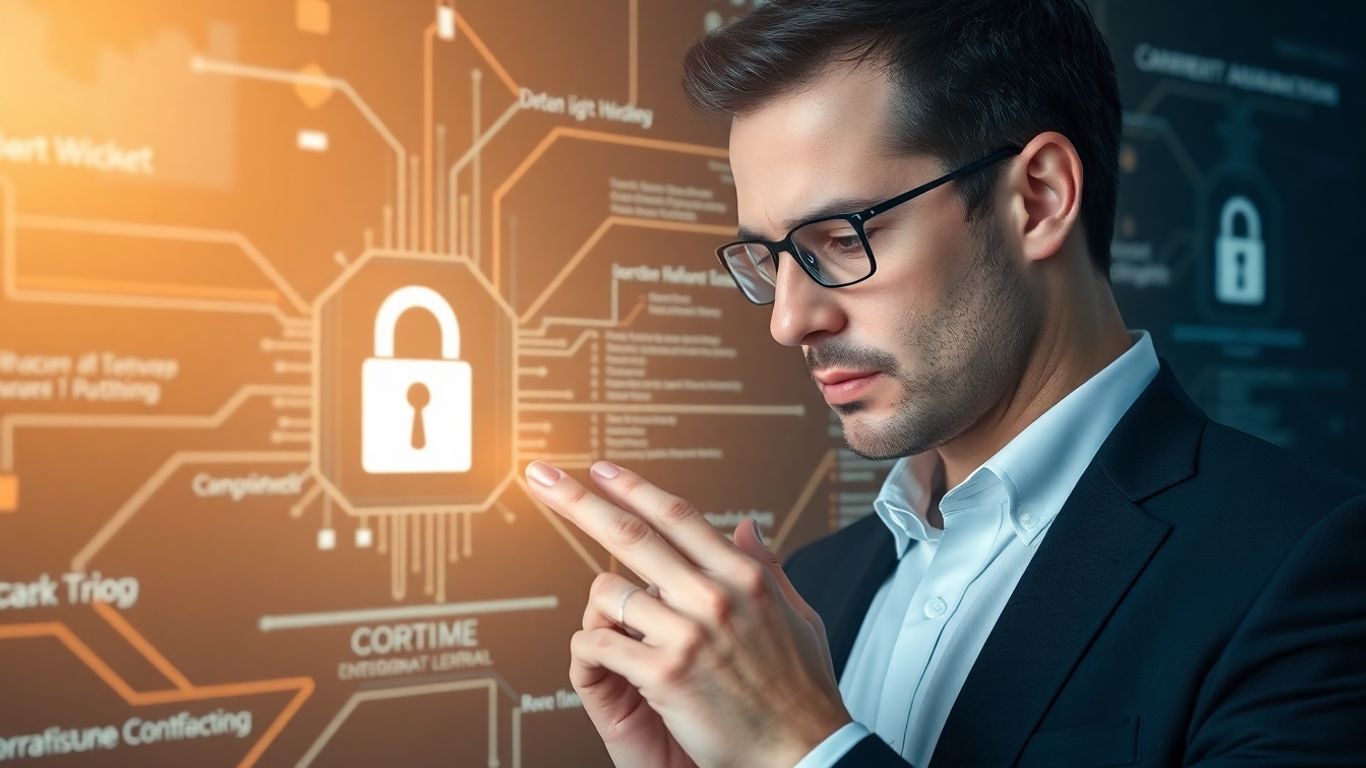[ newsletter ]
Stay ahead of Web3 threats—subscribe to our newsletter for the latest in blockchain security insights and updates.
Thank you! Your submission has been received!
Oops! Something went wrong. Please try again.
Become a successful security auditor with this essential guide. Learn skills, education, career paths, and audit processes.





Thinking about a career as a security auditor? It's a pretty important job, honestly. You're basically the person who checks if all the digital doors and windows are locked up tight for a company. It's not just about finding bugs; it's about making sure everything is running safely and following the rules. This guide will walk you through what it takes to become a successful security auditor, from learning the ropes to actually doing the job.

So, what exactly is a security auditor? Think of them as the digital detectives for an organization's computer systems and networks. They're the folks who dig deep to find weaknesses before the bad guys do. It's not just about looking at code, though that's a big part of it for some. They examine everything from how user accounts are managed to the actual programming that makes software tick. Their main goal is to make sure everything is locked down tight.
This job involves a lot of different tasks. Auditors have to plan out their investigations carefully, figure out how to test systems, and then actually do the testing. This often means using special software to scan for problems, but it also involves hands-on work, like trying to break into systems themselves to see if it's possible. They also check things like:
It's a constant game of cat and mouse. As technology changes and new threats emerge, auditors have to stay on top of their game. They're not just finding problems; they're helping to build a stronger defense.
Why bother with all this checking? Well, it's pretty important. For starters, it helps companies avoid getting hacked, which can save them a ton of money and a lot of embarrassment. Plus, there are a bunch of rules and regulations that businesses have to follow regarding data security. Audits help make sure they're not breaking any laws, which can lead to big fines. It's also about building trust with customers and partners – knowing that their data is being protected is a big deal.
Becoming a security auditor isn't just about knowing a lot of technical stuff; it's a mix of hard skills and how you use them. You've got to be technically sharp, obviously, but also be able to think critically and explain what you find to people who might not be as tech-savvy. It’s a role that demands a broad skillset, and here’s a breakdown of what you’ll need.
This is the bedrock. You can't audit security if you don't understand how it works, and more importantly, how it breaks. This means getting comfortable with a variety of technologies and concepts. Think about programming languages like Python, Java, or C++, because you'll often be looking at the actual code. You also need to know your way around operating systems, whether it's Windows, Linux, or macOS, and how networks are put together and secured. Understanding common software vulnerabilities, encryption methods, and even how penetration testing is done gives you the perspective of an attacker, which is invaluable for finding weaknesses.
Tools can help, sure. There are programs out there that can scan code for common issues. But they're just helpers. You still need to be the one who figures out why something is a problem and what to do about it. Machines can't quite grasp the full picture like a person can.
Once you've got the technical chops, you need to know what to do with that knowledge. Auditing is all about digging deep, finding anomalies, and figuring out the root cause. This means you need to be really good at looking at a lot of information – logs, configurations, code – and spotting what's out of place. It’s like being a detective for digital systems. You’ll be presented with complex issues, and your job is to break them down, understand the implications, and come up with practical solutions. This often involves thinking outside the box, because attackers certainly do.
This is where many technically brilliant people stumble. You might find the most obscure vulnerability, but if you can't explain it clearly to management or the development team, it doesn't do much good. You need to be able to write reports that are easy to understand, even for those who aren't deeply technical. This means avoiding excessive jargon and getting straight to the point. You also need to be able to present your findings verbally, answer questions, and sometimes even persuade people to make changes. Being able to translate complex technical findings into actionable business recommendations is a hallmark of a great security auditor.
So, you're thinking about becoming a security auditor? That's a smart move. It's a field that's always in demand. But before you jump in, you need to know about the education side of things. It's not just about knowing computers; it's about knowing them inside and out, especially when it comes to keeping things safe.
Most folks who get into security auditing start with a solid base in computer science. Think of it like building a house – you need a strong foundation. A degree in computer science gives you that. You'll learn about how computers work, how software is made, and how networks connect everything. This broad knowledge is super important because as an auditor, you'll be looking at all sorts of systems, not just one specific thing. You'll want to cover topics like programming languages, data structures, and operating systems. It really sets you up to understand the bigger picture.
While a general computer science degree is a good start, you'll definitely want to add some specialized cybersecurity training. This is where you really start to focus on the security aspects. You might take courses in things like penetration testing, which is like trying to break into a system to find weaknesses before the bad guys do. Cryptography, the science of secure communication, is another big one. You'll also want to look into areas like digital forensics (figuring out what happened after a security incident) and understanding cybersecurity law. Some universities offer specific degrees or concentrations in cybersecurity, which can be a direct route.
Here's a look at some common educational backgrounds for IT auditors:
As you can see, a lot of people start with an associate's or bachelor's degree. A master's degree can certainly give you an edge, especially for more advanced roles.
Okay, so you've got your degree, maybe some specialized courses too. That's great, but the world of technology moves fast. Like, really fast. What was cutting-edge last year might be old news today. So, you absolutely have to keep learning. This means staying up-to-date with the latest threats, new security tools, and changes in regulations. Joining professional groups, attending webinars or conferences, and even just reading industry blogs are all part of the job. It's not a one-and-done kind of education; it's a commitment to always being a student of security.
The technology landscape is always shifting, and so are the methods used by those who want to exploit systems. To be an effective security auditor, you can't afford to stand still. You need to be constantly updating your knowledge and skills to stay ahead of potential threats and ensure the systems you audit remain secure.
Think of it this way: if you were a doctor, you wouldn't stop learning after medical school, right? It's the same in cybersecurity. You need to keep your skills sharp and your knowledge current to do the job right.
So, you're thinking about becoming a security auditor? That's a smart move. It's a field that's always in demand, and honestly, it's pretty interesting work. But getting there isn't just about knowing a lot about computers; it's about building a solid foundation and then keep adding to it. It’s not usually a job you just step into right out of school, so think of it as a journey.
This is where the rubber meets the road. You can't just read about security; you have to do it. Starting out, you might not be auditing complex systems right away. Instead, look for roles that give you a good groundwork in IT and security. Think about positions like a security administrator, where you're managing access and systems, or a network administrator, getting hands-on with how everything connects. Even roles like a vulnerability assessor or a junior security analyst can be great stepping stones. These jobs let you see how security measures are put into practice and where they sometimes fall short. The more diverse your early experience, the better equipped you'll be to spot issues later on.
Here are some common entry points:
Once you've got some experience under your belt, certifications become your best friend. They're like a stamp of approval that tells employers you've met certain standards and know your stuff. For security auditors, there are a few key ones that really stand out. Getting these shows you're serious about the profession and have put in the work to learn specific skills.
Some certifications to aim for include:
As you gain experience and collect certifications, your career can really take off. You might start as a general security auditor, but many professionals find themselves specializing over time. Maybe you become the go-to person for cloud security audits, or perhaps you focus on auditing the security of mobile applications. Some auditors even move into management roles, leading audit teams. The field is always changing, so staying curious and adaptable is key to moving up and finding your niche.
The path to becoming a successful security auditor is rarely a straight line. It involves a mix of formal education, practical hands-on experience, and a commitment to continuous learning. Building a strong reputation takes time, dedication, and a keen eye for detail.
So, you want to know how a security audit actually goes down? It's not just about poking around; there's a method to the madness. Think of it like a thorough check-up for a company's digital health. The whole point is to find weak spots before the bad guys do. It's a structured journey, and each part matters.
This is where the groundwork gets laid. You can't just jump in blind. First, you need to know what you're auditing. That means mapping out all the digital and physical stuff the company has – every server, every laptop, every piece of sensitive data. It's also super important to figure out what you're looking for. Are you trying to meet specific rules like HIPAA, or is it more about general security improvements? Defining the scope and objectives is key here. You also need to think about who's going to do the audit. Sometimes it's the company's own IT team, other times it's outside experts, or a mix of both. Outside folks often bring a fresh perspective, which can be really helpful.
Once planning is done, it's time to get hands-on. This phase involves a few different things. You'll talk to people, review documents, and run technical tests. Interviews help you understand how things should work and how people actually do things. You'll look at policies, network maps, and other paperwork to see if they match reality. Then comes the technical side. This can involve using software to scan for vulnerabilities, checking configurations, and sometimes even trying to break into systems (that's penetration testing). Auditors also spend a lot of time verifying access controls – making sure only the right people have access to the right things. They'll look for things like old, unused accounts that could be an easy way in for attackers.
After all the digging, you've got a pile of information. Now, you need to make sense of it. This is where you analyze all the data you've collected. Auditors look at logs to see if security events are being tracked properly. They might even test backup and recovery systems to make sure the company can bounce back if something goes wrong. The final step is putting it all together in a report. This report isn't just a list of problems; it ranks the issues by how serious they are and, most importantly, gives clear recommendations on how to fix them. It's basically a roadmap for making the company more secure.
The goal isn't just to point out flaws, but to provide actionable steps that can actually improve the security posture of the organization. It's about making things better, not just finding fault.
Here's a look at what might be checked:

So, you're looking into becoming a security auditor, and you've probably heard a lot about compliance. It's a big part of the job, making sure companies aren't just saying they're secure, but that they're actually following the rules. These rules, or frameworks, are basically sets of guidelines designed to protect sensitive information. Think of them like the building codes for digital security. Different industries have different ones, and knowing them is pretty important.
Some of the big players you'll run into include:
It's not just about ticking boxes, though. These frameworks are there for a reason – to prevent data breaches and protect people.
Audits are the way companies prove they're actually doing what the compliance frameworks say they should. It's like a report card for their security. Without regular audits, a company might think they're compliant, but they could have blind spots they don't even know about. Auditors come in, check the systems, talk to people, and look at the documentation to see if everything lines up. This process helps identify gaps before a real problem occurs. It's a proactive step that can save a company a lot of headaches, not to mention fines and damage to their reputation. Think of it as a regular check-up for a company's digital health.
Companies are starting to get smarter about how they handle compliance. Instead of just trying to meet every single requirement on a long checklist, they're focusing on the risks that actually matter to them. This means figuring out what their most sensitive data is, what their biggest threats are, and then putting their security efforts and audit focus there. It's a more practical way to do things. You map out all your digital and physical assets first, then figure out what's most important to protect. After that, you set clear goals for the audit – are you looking for vulnerabilities, or just checking if you meet a specific standard? This approach helps make sure that the audit is actually useful and addresses the real security concerns, rather than just being a bureaucratic exercise. It's about working smarter, not just harder, to keep things secure.
So, that's the rundown on becoming a security auditor. It's not a path for the faint of heart, that's for sure. You'll need a solid mix of technical smarts, a knack for spotting details others miss, and a willingness to keep learning because this field changes fast. Think of it like being a digital detective, always on the lookout for clues and potential trouble spots before they become big problems. If you're up for the challenge and enjoy the puzzle of keeping systems safe, this career could be a really good fit. Just remember to keep those skills sharp and stay curious.
Think of a security auditor as a detective for computer systems. They check if a company's digital stuff, like computers and networks, is safe from bad guys trying to break in. They look for weak spots and make sure everything is protected the right way.
While a degree in computer science or something similar is a great start, it's not the only way. You also need to keep learning and get special training or certifications to show you know your stuff about keeping things secure.
You need to be good with computers and know how they work, especially when it comes to keeping them safe. Being able to figure out problems, like a puzzle, and explaining what you find clearly to others is also super important.
Usually, no. Being a security auditor is a bit more advanced. You'll likely need to work in other computer security jobs first to get enough experience before you can become a full-time auditor.
They have a plan! First, they figure out what they need to check. Then, they look for proof, like checking computer logs or testing systems. Finally, they write a report explaining what they found and how to fix any problems.
Audits help companies follow rules and laws about keeping data safe, which can prevent big fines. They also help find and fix security holes before hackers can use them, keeping the company's information and customers safe.


